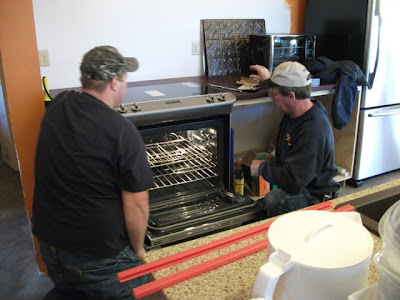The world of Energy Star appliances according to Jim...
I did a great deal of research before purchasing new
appliances for our home. My first goal was to find Energy Star rated ones and
the most efficient. Refrigerators, dishwashers, clothes washers have Energy
Star ratings; however, ranges and dryers do not because of the heating
elements. Fortunately, I found a range that has technology that is more
efficient, having induction cooking that does not use standard heating
elements, but magnetic technology and a convection oven that cooks faster
meaning less energy to prepare a meal. The clothes dryer’s efficiency is based
on how well the clothes washer wrings out the water from the wet laundry and if
it has built in sensors to shut down the dryer as soon as the laundry is dry.
Refrigerator:
Maytag bottom freezer modelMBR2258XES. This is a no frills fridge with no water
in the door. We picked this because we access the refrigerator more often than
the freezer and plan on storing more fresh food. It is equipped with humidity
controlled drawers that keep veggies and fruit fresh longer. This unit is one
of the most efficient around and costs about $43.00 per year to operate.
Dishwasher: We
discovered that a dishwasher is considered a luxury item by the State of North Carolina which is
only significant because this past weekend Energy Star appliances were exempt
from sales tax. This is frustrating because the federal government give an
Energy Star rating to dishwashers that meet the criteria. My research
discovered that most dishwasher use less water than hand washing dishes. I
found that Bosch, a European brand is one of the most efficient made because in
Europe water regulations are way more strict than in the US. The model SHE7ER55UC
uses around 1.9 gallons of water per
full load and even less with its half full and short cycle options. It will
cost about $23.00 per year in
electricity running about 4 loads a week. I have not factored in water cost
because we have a well. Also the cost
will be lower if we run the dishwasher at the times our solar hot water system
is working.
Range/Oven: This
was the most expensive appliance on our list because of the induction hybrid
feature. Frigidaire FPCS3085LF. Here is the lowdown on Induction:
1. The
element's electronics power a coil that produces a high-frequency
electromagnetic field.
2. That
field penetrates the metal of the ferrous (magnetic-material) cooking vessel
and sets up a circulating electric current, which generates heat.
3. The
heat generated in the cooking vessel is transferred to the vessel's
contents.
4. Nothing
outside the vessel is affected by the field--as soon as the vessel is removed
from the element, or the element turned off, heat generation stops.
Believe it or not, this is not new technology; however, it has been made
more efficient. This range also has traditional electronic burners to use until
we master cooking with induction.The oven has a convection feature. Convection ovens use fans to force air movement. By moving fast hot air past the food, convection ovens can operate at a lower temperature than a standard conventional oven and yet cook food more quickly. The air circulation, or convection, tends to eliminate "hot spots" and thus food may bake more evenly.
Clothes Washer:
We went with the Samsung WF461ABW. It is
front load (uses less water than top loaded) and it will cost about $9.00 per year to run if we were an
average family doing 8 loads a week and consuming 4388 gallons of water a year.
Wow, this statistic blew me away! That is a lot of valuable water down the
drain. After finding out this number I checked and the average person in the US
uses 80-100 gallons of water per day for showers, laundry, and toilet flushing.
Anyway, the machine I picked is on the most efficient list.
Clothes Dryer: We
went with the Samsung WF431ABW and it has sensor drying. When paired with the
above washer it will be efficient. If we hang the clothes on a line will be
100% efficient. Edrianna did request a close line. It is on the project list.

















































